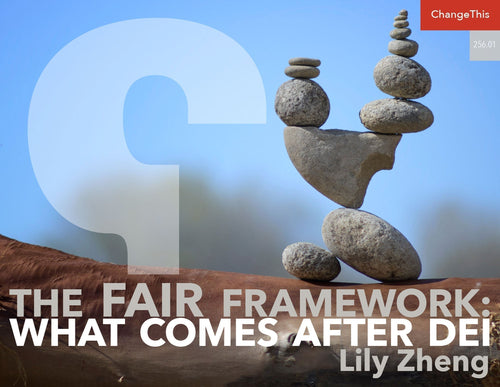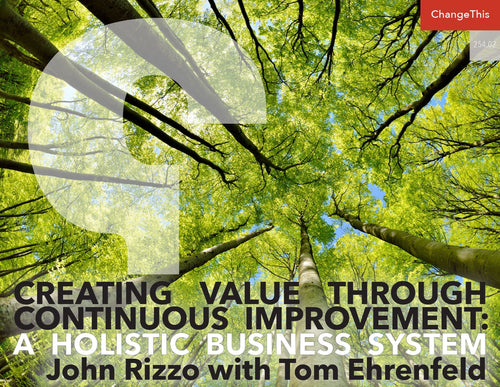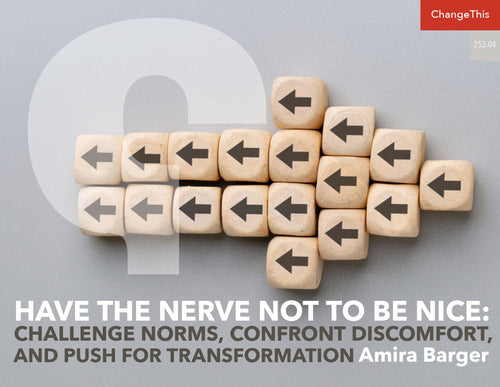The Secrets to Success During Change and Disruption
We all have to deal with change at our jobs. Joel Zeff offers an actionable and improvisational way to embrace it.

I get up every morning determined to both change the world and have one hell of a good time. Sometimes this makes planning my day difficult.
—E. B. White
I do not speak behind a lectern. They are large, cumbersome, and create a barrier between the audience and speaker. When there is a lectern, I always ask the client to move it off the stage to create more space to play the improvisation exercises. I have learned something very important in my speaking career: People do not like to move the lectern. I am not talking about physically moving it. That is fairly easy. It is the idea that there will be a “change” by moving it. The change kills them. The stage manager or client will look at me as though I’d asked them if I could borrow their car to enter a demolition derby next week in Missouri. People do not like change.
Like most changes, moving the lectern is not important. We only assign importance to the act of moving it. Nobody in the audience really cares where the lectern is located on the stage. I am sure an attendee has never written on their meeting evaluation, “I didn’t like the lectern placement, but the juggling hypnotist was awesome.”
The issue is that I am changing their decision. I once had a client who refused to move the lectern (which was placed center stage). I explained that I do not speak from behind a lectern and that I use improvisation games that tend to work better if I am in the middle of the stage where the audience can see me. “Nope, we just cannot move the lectern,” he said. “A vice president is going to speak after your program, and he rehearsed with the lectern,” the client explained.
“Can we ask the vice president if we can move the lectern?” Nope. He is a vice president, I was told. He is a very important person. In what kind of world do we live where the vice president of International GlobalCom InfoDataVerse Solutions (not the company’s real name) is so untouchable that a mere commoner such as I could possibly ask him if we could move the lectern? I casually walked up and spoke with the vice president. Sit down for the big reveal: He did not care about the location of the lectern, so it was moved. Also, true story, the same vice president came on stage dressed as a Roman gladiator/ emperor/soldier. I am not sure how the outfit relates to change, but it still makes me laugh.
You see, not only does removing the lectern involve changing a prior decision; it now involves work. The point of the story is that people do not like change, and they do not like moving stuff. Ask your friends to come over and help you move your house. Watch the reaction. Nobody wants to move anything. And nobody likes change.
Of course, we end up moving the lectern. And then, after I am finished speaking, a stressed-out person moves the lectern back for the vice president. And then the vice president of International GlobalCom InfoDataVerse Solutions walks on stage, does not go anywhere near the lectern, and thanks everyone for coming to the meeting. He does not even walk close enough to the lectern to touch the damn thing. He speaks for about 97 seconds.
CHANGE IS SCARY. THE IDEA OF CHANGE IS EVEN SCARIER
We all fear change. Change represents something unknown. We might have to learn something new. We might have to leave our comfort zone. We might even have to change the way we work. We prefer to curl up in our warm Pottery Barn blanket and dismiss or ignore change. It does not matter. Change will happen. We will never arrive at work one day and hear someone say, “Okay, we are all done changing here at International GlobalCom InfoDataVerse Solutions.” Cool. I knew it would happen on a Tuesday. This really frees up the rest of the week. Can we order pizza?
Improvisation taught me four important lessons to succeed during change:
- Be prepared for change.
- Be open and flexible to change.
- Embrace change.
- Be in the moment during change.
All of the improvisation games I use highlight these lessons. For this discussion, I want to discuss a game called Know-it-All. I invite three audience members to come on stage and answer questions. The key is the volunteers can only say one word at a time, in order of how they are standing, to complete the sentence. The three players have to listen, support each other, and work together to create a sentence. Like all improvisation games, there is constant change and disruption. And the only way the game works is if everyone is prepared for change, is open and flexible to change, is a great listener, and embraces change.
BE PREPARED FOR CHANGE
When I ask audience volunteers to join me on stage, they make their first choice as they get up from their seat. They are choosing to be prepared for change. They have no idea what game I am going to play, their role or responsibility, or what will happen during the game.
They choose to prepare for change. Huge. Preparing for change will set their tone, approach, energy, and attitude. They understand change will happen. The volunteers have embraced change. The change and disruption will not surprise them, frustrate them, stress them out, or create impatience.
BE OPEN AND FLEXIBLE TO CHANGE
Change is going to happen whether we like it or not. Most change is completely out of our control. We only control how we react to it. Too many times, we even give up control of how we react to change. Would you really choose to be stressed or frustrated? No, you would not. Choosing how you react to change determines your attitude, approach, and success. We choose to be open and flexible. We choose to be helpful, patient, supportive, and understanding.
We all have different backgrounds, experiences, skills, and education. We will not all solve the problem the same way. Our differences make us a stronger team. We each see the problem through a different lens. We must be open and flexible to each other’s ideas. That flexibility allows us to build on the idea, and grow and expand the idea.
EMBRACE CHANGE
Improvisation teaches you to embrace change. You never know what will happen because there is no script, no plan, and no rehearsal. Just by adjusting how you approach change, you determine your attitude.
Improvisation is constant chaos and disruption. I have no idea what the other performer will say and do. Embracing change will force you to trust your abilities, it creates confidence, and makes you more aware of the situation. It does not mean all change is right or good. Some change sucks. Some change does not work. Embracing just means we understand change is going to happen. We can then decide how to move forward with the change.
BE IN THE MOMENT DURING CHANGE
Choosing to embrace change forces you to be more present and in the moment. You have a heightened sense of awareness because you want to react and produce success. When you are in the moment, you focus on the game, the team, and the objective. You are truly listening and not waiting for your turn to speak. Being in the moment makes you a better leader, teammate, communicator, and innovator. You are more productive.
I have played Know-it-All thousands of times. Some people do not listen to each other, and the game does not work. Some people try to anticipate what word is coming next, and the game does not work. Some people try to project what they want the other person to say, and the game does not work. The game works only when each player listens and reacts with openness and flexibility, embraces change, prepares for change, and is present. You will never know what word is coming next or where the sentence is headed. Just like your job, you never know what issue or challenge will surface next. It is impossible to know.
And how do we react to change? Most of the time our first reaction to change is frustration, impatience, and stress. We are not preparing ourselves for change. The surprise of change creates the frustration. We know change is going to happen. I live in Texas. It’s hot in Texas. I know the air conditioner will crash almost every summer right about the time Texas reaches the same temperature as the surface of the sun. I call the air conditioner repairman. He comes out two days later. He will need a part to fix the air conditioner. The part will arrive next week, he tells me. So, each summer, my wife and I sit around sweating as if we were unloading big rigs at a warehouse in hell. And every summer during this intense passion play, I am frustrated, impatient, and stressed. I know the change is coming. I am just not very open and flexible when I am sweating off my eyebrows.
CHANGE IS GOING TO HAPPEN—WE MIGHT AS WELL BE OPEN AND FLEXIBLE
We all know we have to deal with change at our jobs. You will suffer growing pains under new management. You will have to learn a new software program. The company will introduce a new “state-of-the-art, world-class” product that will kick the competition’s ass in French Guiana. Someone is going to move your desk from the cubicle by the window to the corner near the bathroom. The same corner that has an average midday temperature of 32° Fahrenheit. There will be new competition, there will be an economic downturn, supply chain issues, someone will make a mistake, something will break—there will always be something. How we deal with change determines our stress and passion, and plays a role in our leadership, communication, and creativity. If we do not manage our stress, we lose our passion. We deflate. We wallow. We mope.
One of the interesting lessons I learned from the Know-it-All game is that either the whole team will achieve success or the whole team will fail. Success cannot happen to only one or two people in the game. Either everyone is going to meet the objective and create a sentence that makes sense or the team will struggle. This is an important lesson. Our success is dependent on each other’s success. We must help each other. The whole object of the Know-it-All game is to answer the question as a team, working together for a common cause. Sounds familiar, huh?
Again, improvisation forces the players to make the right decision to meet the objective. It forces the team to listen, to be open and flexible, and to help each other create the sentence.
Most of the change that causes stress we end up forgetting in a short time. It might be a few days. It might be a few hours. Our mind realizes the change is not that important. Why cannot we figure this out when the change occurs? If we can direct our energy toward things that really matter, we could reduce our stress.
ASK TWO SIMPLE QUESTIONS TO MANAGE CHANGE
We have to manage our change. I deal with change by asking myself two simple questions:
- Does the change affect my ability to be happy and successful in my job?
- Does the change affect the ability of those around me—my family, colleagues, clients, and vendors—to be happy and successful in their jobs?
If both answers are no, then I know the change is not that important. I can direct my energy and passion toward something that does affect my success and happiness. Trouble starts creeping up on our shoulders when we spend too much time and energy on actions and words outside these two questions. Ask yourself these two questions. Really, everything that truly matters is covered by these two questions.
Sometimes after I play Know-it-All, I ask the audience to pair up and play the two-person version of the game. I ask them to find another pair and have a conversation one word at a time. After the game, I ask the audience how they dealt with openness and flexibility. The answer is always the same: they listened to each other. Pretty simple, huh? If for one second during the game, they stop listening or look at something shiny in the room, the game fails. They must listen and work in the moment.
Let us think about what happens when each player listens:
- The players meet their objective and create a sentence that makes sense.
- The players become more creative and confident.
- The players work together as a team.
- The players communicate successfully.
- The players take responsibility and show initiative.
- The players have fun.
If I asked any manager what they wanted from their team, do you think the manager would list anything different? This is what we want from each other. The foundation to that success is always the same thing: listening. When I tell my audiences that we all must listen more actively, everyone nods in approval: “Yes, we must all listen better. He is right. He is not talking about me, but others in this room definitely need to listen better.” We all need to listen better.
HOW TO PLAY KNOW-IT-ALL WITH YOUR TEAM
- Have everyone pair up. You can also have a trio. It is just easier with two people.
- Each pair needs to work with another pair.
- Decide who is going to start the sentence for each team.
- Each person can only say one word at a time. The players alternate saying a word until they have a complete sentence. One team will start by asking a question one word at a time. The other pair will answer the question the same way. The team that just answered the question will then ask the other team a question (again one word at a time).
- Try to say a word as fast as you can after your team member says their word. If you try to look for the right word or right answer, you will slow the game down, and it will lose momentum. You will never find the right word. Just say a word that follows the word that preceded it.
- Do not just say random words. You must make sense.
- Be sure to listen to your teammates.
- The sentence will naturally come to an end. Once the team finishes answering the question, they should ask a question. Again, each person can only say one word at a time.
- It is okay if you make a mistake. Laugh at the mistake and try again.
- Remember to be open and flexible to your teammates and the words they choose. Be in the moment (listen). Prepare yourself because you do not know what word will come next. Embrace the change and be confident in your abilities. Have fun.
Change is going to happen every day. We have to deal with change in a productive manner that allows us to stay passionate, creative, and energized. If we spend all day frustrated and stressed, we will have no fuel for our happiness. We can manage change. We can reduce our stress and at the same time increase our passion. Remember the secrets of the Know-it-All game: Embrace change, be open and flexible during change, be prepared for change, and be in the moment during change.
And, finally, just move the damn lectern.
Excerpted from Make the Right Choice: Lead with Passion, Elevate Your Team, and Unleash the Fun at Work by Joel Zeff, published by Wiley. Copyright © 2024 by Joel Zeff. All rights reserved.
About the Author
Joel Zeff is a national speaker, work culture expert, author, and humorist. His spontaneous humor and vital messages have thrilled audiences for more than 25 years. Joel has shared his experience and insight on collaboration, leadership, change, communication, innovation, fun and passion at more than 2,500 events. For more information, visit his web site at www.joelzeff.com.








































